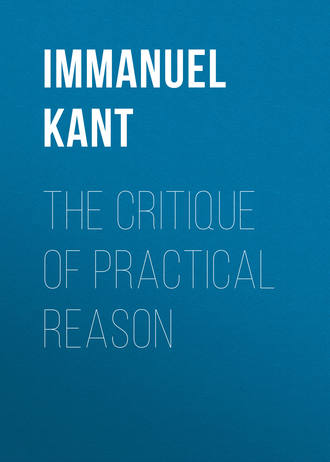 полная версия
полная версияThe Critique of Practical Reason
This feeling (which we call the moral feeling) is therefore produced simply by reason. It does not serve for the estimation of actions nor for the foundation of the objective moral law itself, but merely as a motive to make this of itself a maxim. But what name could we more suitably apply to this singular feeling which cannot be compared to any pathological feeling? It is of such a peculiar kind that it seems to be at the disposal of reason only, and that pure practical reason.
{BOOK_1|CHAPTER_3 ^paragraph 10}
Respect applies always to persons only- not to things. The latter may arouse inclination, and if they are animals (e.g., horses, dogs, etc.), even love or fear, like the sea, a volcano, a beast of prey; but never respect. Something that comes nearer to this feeling is admiration, and this, as an affection, astonishment, can apply to things also, e.g., lofty mountains, the magnitude, number, and distance of the heavenly bodies, the strength and swiftness of many animals, etc. But all this is not respect. A man also may be an object to me of love, fear, or admiration, even to astonishment, and yet not be an object of respect. His jocose humour, his courage and strength, his power from the rank he has amongst others, may inspire me with sentiments of this kind, but still inner respect for him is wanting. Fontenelle says, "I bow before a great man, but my mind does not bow." I would add, before an humble plain man, in whom I perceive uprightness of character in a higher degree than I am conscious of in myself, – my mind bows whether I choose it or not, and though I bear my head never so high that he may not forget my superior rank. Why is this? Because his example exhibits to me a law that humbles my self-conceit when I compare it with my conduct: a law, the practicability of obedience to which I see proved by fact before my eyes. Now, I may even be conscious of a like degree of uprightness, and yet the respect remains. For since in man all good is defective, the law made visible by an example still humbles my pride, my standard being furnished by a man whose imperfections, whatever they may be, are not known to me as my own are, and who therefore appears to me in a more favourable light. Respect is a tribute which we cannot refuse to merit, whether we will or not; we may indeed outwardly withhold it, but we cannot help feeling it inwardly.
Respect is so far from being a feeling of pleasure that we only reluctantly give way to it as regards a man. We try to find out something that may lighten the burden of it, some fault to compensate us for the humiliation which such an example causes. Even the dead are not always secure from this criticism, especially if their example appears inimitable. Even the moral law itself in its solemn majesty is exposed to this endeavour to save oneself from yielding it respect. Can it be thought that it is for any other reason that we are so ready to reduce it to the level of our familiar inclination, or that it is for any other reason that we all take such trouble to make it out to be the chosen precept of our own interest well understood, but that we want to be free from the deterrent respect which shows us our own unworthiness with such severity? Nevertheless, on the other hand, so little is there pain in it that if once one has laid aside self-conceit and allowed practical influence to that respect, he can never be satisfied with contemplating the majesty of this law, and the soul believes itself elevated in proportion as it sees the holy law elevated above it and its frail nature. No doubt great talents and activity proportioned to them may also occasion respect or an analogous feeling. It is very proper to yield it to them, and then it appears as if this sentiment were the same thing as admiration. But if we look closer we shall observe that it is always uncertain how much of the ability is due to native talent, and how much to diligence in cultivating it. Reason represents it to us as probably the fruit of cultivation, and therefore as meritorious, and this notably reduces our self-conceit, and either casts a reproach on us or urges us to follow such an example in the way that is suitable to us. This respect, then, which we show to such a person (properly speaking, to the law that his example exhibits) is not mere admiration; and this is confirmed also by the fact that when the common run of admirers think they have learned from any source the badness of such a man's character (for instance Voltaire's) they give up all respect for him; whereas the true scholar still feels it at least with regard to his talents, because he is himself engaged in a business and a vocation which make imitation of such a man in some degree a law.
Respect for the moral law is, therefore, the only and the undoubted moral motive, and this feeling is directed to no object, except on the ground of this law. The moral law first determines the will objectively and directly in the judgement of reason; and freedom, whose causality can be determined only by the law, consists just in this, that it restricts all inclinations, and consequently self-esteem, by the condition of obedience to its pure law. This restriction now has an effect on feeling, and produces the impression of displeasure which can be known a priori from the moral law. Since it is so far only a negative effect which, arising from the influence of pure practical reason, checks the activity of the subject, so far as it is determined by inclinations, and hence checks the opinion of his personal worth (which, in the absence of agreement with the moral law, is reduced to nothing); hence, the effect of this law on feeling is merely humiliation. We can, therefore, perceive this a priori, but cannot know by it the force of the pure practical law as a motive, but only the resistance to motives of the sensibility. But since the same law is objectively, that is, in the conception of pure reason, an immediate principle of determination of the will, and consequently this humiliation takes place only relatively to the purity of the law; hence, the lowering of the pretensions of moral self-esteem, that is, humiliation on the sensible side, is an elevation of the moral, i.e., practical, esteem for the law itself on the intellectual side; in a word, it is respect for the law, and therefore, as its cause is intellectual, a positive feeling which can be known a priori. For whatever diminishes the obstacles to an activity furthers this activity itself. Now the recognition of the moral law is the consciousness of an activity of practical reason from objective principles, which only fails to reveal its effect in actions because subjective (pathological) causes hinder it. Respect for the moral law then must be regarded as a positive, though indirect, effect of it on feeling, inasmuch as this respect weakens the impeding influence of inclinations by humiliating self-esteem; and hence also as a subjective principle of activity, that is, as a motive to obedience to the law, and as a principle of the maxims of a life conformable to it. From the notion of a motive arises that of an interest, which can never be attributed to any being unless it possesses reason, and which signifies a motive of the will in so far as it is conceived by the reason. Since in a morally good will the law itself must be the motive, the moral interest is a pure interest of practical reason alone, independent of sense. On the notion of an interest is based that of a maxim. This, therefore, is morally good only in case it rests simply on the interest taken in obedience to the law. All three notions, however, that of a motive, of an interest, and of a maxim, can be applied only to finite beings. For they all suppose a limitation of the nature of the being, in that the subjective character of his choice does not of itself agree with the objective law of a practical reason; they suppose that the being requires to be impelled to action by something, because an internal obstacle opposes itself. Therefore they cannot be applied to the Divine will.
There is something so singular in the unbounded esteem for the pure moral law, apart from all advantage, as it is presented for our obedience by practical reason, the voice of which makes even the boldest sinner tremble and compels him to hide himself from it, that we cannot wonder if we find this influence of a mere intellectual idea on the feelings quite incomprehensible to speculative reason and have to be satisfied with seeing so much of this a priori that such a feeling is inseparably connected with the conception of the moral law in every finite rational being. If this feeling of respect were pathological, and therefore were a feeling of pleasure based on the inner sense, it would be in vain to try to discover a connection of it with any idea a priori. But [it] is a feeling that applies merely to what is practical, and depends on the conception of a law, simply as to its form, not on account of any object, and therefore cannot be reckoned either as pleasure or pain, and yet produces an interest in obedience to the law, which we call the moral interest, just as the capacity of taking such an interest in the law (or respect for the moral law itself) is properly the moral feeling.
The consciousness of a free submission of the will to the law, yet combined with an inevitable constraint put upon all inclinations, though only by our own reason, is respect for the law. The law that demands this respect and inspires it is clearly no other than the moral (for no other precludes all inclinations from exercising any direct influence on the will). An action which is objectively practical according to this law, to the exclusion of every determining principle of inclination, is duty, and this by reason of that exclusion includes in its concept practical obligation, that is, a determination to actions, however reluctantly they may be done. The feeling that arises from the consciousness of this obligation is not pathological, as would be a feeling produced by an object of the senses, but practical only, that is, it is made possible by a preceding (objective) determination of the will and a causality of the reason. As submission to the law, therefore, that is, as a command (announcing constraint for the sensibly affected subject), it contains in it no pleasure, but on the contrary, so far, pain in the action. On the other hand, however, as this constraint is exercised merely by the legislation of our own reason, it also contains something elevating, and this subjective effect on feeling, inasmuch as pure practical reason is the sole cause of it, may be called in this respect self-approbation, since we recognize ourselves as determined thereto solely by the law without any interest, and are now conscious of a quite different interest subjectively produced thereby, and which is purely practical and free; and our taking this interest in an action of duty is not suggested by any inclination, but is commanded and actually brought about by reason through the practical law; whence this feeling obtains a special name, that of respect.
{BOOK_1|CHAPTER_3 ^paragraph 15}
The notion of duty, therefore, requires in the action, objectively, agreement with the law, and, subjectively in its maxim, that respect for the law shall be the sole mode in which the will is determined thereby. And on this rests the distinction between the consciousness of having acted according to duty and from duty, that is, from respect for the law. The former (legality) is possible even if inclinations have been the determining principles of the will; but the latter (morality), moral worth, can be placed only in this, that the action is done from duty, that is, simply for the sake of the law. 11
It is of the greatest importance to attend with the utmost exactness in all moral judgements to the subjective principle of all maxims, that all the morality of actions may be placed in the necessity of acting from duty and from respect for the law, not from love and inclination for that which the actions are to produce. For men and all created rational beings moral necessity is constraint, that is obligation, and every action based on it is to be conceived as a duty, not as a proceeding previously pleasing, or likely to be pleasing to us of our own accord. As if indeed we could ever bring it about that without respect for the law, which implies fear, or at least apprehension of transgression, we of ourselves, like the independent Deity, could ever come into possession of holiness of will by the coincidence of our will with the pure moral law becoming as it were part of our nature, never to be shaken (in which case the law would cease to be a command for us, as we could never be tempted to be untrue to it).
{BOOK_1|CHAPTER_3 ^paragraph 20}
The moral law is in fact for the will of a perfect being a law of holiness, but for the will of every finite rational being a law of duty, of moral constraint, and of the determination of its actions by respect for this law and reverence for its duty. No other subjective principle must be assumed as a motive, else while the action might chance to be such as the law prescribes, yet, as does not proceed from duty, the intention, which is the thing properly in question in this legislation, is not moral.
It is a very beautiful thing to do good to men from love to them and from sympathetic good will, or to be just from love of order; but this is not yet the true moral maxim of our conduct which is suitable to our position amongst rational beings as men, when we pretend with fanciful pride to set ourselves above the thought of duty, like volunteers, and, as if we were independent on the command, to want to do of our own good pleasure what we think we need no command to do. We stand under a discipline of reason and in all our maxims must not forget our subjection to it, nor withdraw anything therefrom, or by an egotistic presumption diminish aught of the authority of the law (although our own reason gives it) so as to set the determining principle of our will, even though the law be conformed to, anywhere else but in the law itself and in respect for this law. Duty and obligation are the only names that we must give to our relation to the moral law. We are indeed legislative members of a moral kingdom rendered possible by freedom, and presented to us by reason as an object of respect; but yet we are subjects in it, not the sovereign, and to mistake our inferior position as creatures, and presumptuously to reject the authority of the moral law, is already to revolt from it in spirit, even though the letter of it is fulfilled.
With this agrees very well the possibility of such a command as: Love God above everything, and thy neighbour as thyself. 12 For as a command it requires respect for a law which commands love and does not leave it to our own arbitrary choice to make this our principle. Love to God, however, considered as an inclination (pathological love), is impossible, for He is not an object of the senses. The same affection towards men is possible no doubt, but cannot be commanded, for it is not in the power of any man to love anyone at command; therefore it is only practical love that is meant in that pith of all laws. To love God means, in this sense, to like to do His commandments; to love one's neighbour means to like to practise all duties towards him. But the command that makes this a rule cannot command us to have this disposition in actions conformed to duty, but only to endeavour after it. For a command to like to do a thing is in itself contradictory, because if we already know of ourselves what we are bound to do, and if further we are conscious of liking to do it, a command would be quite needless; and if we do it not willingly, but only out of respect for the law, a command that makes this respect the motive of our maxim would directly counteract the disposition commanded. That law of all laws, therefore, like all the moral precepts of the Gospel, exhibits the moral disposition in all its perfection, in which, viewed as an ideal of holiness, it is not attainable by any creature, but yet is the pattern which we should strive to approach, and in an uninterrupted but infinite progress become like to. In fact, if a rational creature could ever reach this point, that he thoroughly likes to do all moral laws, this would mean that there does not exist in him even the possibility of a desire that would tempt him to deviate from them; for to overcome such a desire always costs the subject some sacrifice and therefore requires self-compulsion, that is, inward constraint to something that one does not quite like to do; and no creature can ever reach this stage of moral disposition. For, being a creature, and therefore always dependent with respect to what he requires for complete satisfaction, he can never be quite free from desires and inclinations, and as these rest on physical causes, they can never of themselves coincide with the moral law, the sources of which are quite different; and therefore they make it necessary to found the mental disposition of one's maxims on moral obligation, not on ready inclination, but on respect, which demands obedience to the law, even though one may not like it; not on love, which apprehends no inward reluctance of the will towards the law. Nevertheless, this latter, namely, love to the law (which would then cease to be a command, and then morality, which would have passed subjectively into holiness, would cease to be virtue) must be the constant though unattainable goal of his endeavours. For in the case of what we highly esteem, but yet (on account of the consciousness of our weakness) dread, the increased facility of satisfying it changes the most reverential awe into inclination, and respect into love; at least this would be the perfection of a disposition devoted to the law, if it were possible for a creature to attain it.
{BOOK_1|CHAPTER_3 ^paragraph 25}
This reflection is intended not so much to clear up the evangelical command just cited, in order to prevent religious fanaticism in regard to love of God, but to define accurately the moral disposition with regard directly to our duties towards men, and to check, or if possible prevent, a merely moral fanaticism which infects many persons. The stage of morality on which man (and, as far as we can see, every rational creature) stands is respect for the moral law. The disposition that he ought to have in obeying this is to obey it from duty, not from spontaneous inclination, or from an endeavour taken up from liking and unbidden; and this proper moral condition in which he can always be is virtue, that is, moral disposition militant, and not holiness in the fancied possession of a perfect purity of the disposition of the will. It is nothing but moral fanaticism and exaggerated self-conceit that is infused into the mind by exhortation to actions as noble, sublime, and magnanimous, by which men are led into the delusion that it is not duty, that is, respect for the law, whose yoke (an easy yoke indeed, because reason itself imposes it on us) they must bear, whether they like it or not, that constitutes the determining principle of their actions, and which always humbles them while they obey it; fancying that those actions are expected from them, not from duty, but as pure merit. For not only would they, in imitating such deeds from such a principle, not have fulfilled the spirit of the law in the least, which consists not in the legality of the action (without regard to principle), but in the subjection of the mind to the law; not only do they make the motives pathological (seated in sympathy or self-love), not moral (in the law), but they produce in this way a vain, high-flying, fantastic way of thinking, flattering themselves with a spontaneous goodness of heart that needs neither spur nor bridle, for which no command is needed, and thereby forgetting their obligation, which they ought to think of rather than merit. Indeed actions of others which are done with great sacrifice, and merely for the sake of duty, may be praised as noble and sublime, but only so far as there are traces which suggest that they were done wholly out of respect for duty and not from excited feelings. If these, however, are set before anyone as examples to be imitated, respect for duty (which is the only true moral feeling) must be employed as the motive- this severe holy precept which never allows our vain self-love to dally with pathological impulses (however analogous they may be to morality), and to take a pride in meritorious worth. Now if we search we shall find for all actions that are worthy of praise a law of duty which commands, and does not leave us to choose what may be agreeable to our inclinations. This is the only way of representing things that can give a moral training to the soul, because it alone is capable of solid and accurately defined principles.
If fanaticism in its most general sense is a deliberate over stepping of the limits of human reason, then moral fanaticism is such an over stepping of the bounds that practical pure reason sets to mankind, in that it forbids us to place the subjective determining principle of correct actions, that is, their moral motive, in anything but the law itself, or to place the disposition which is thereby brought into the maxims in anything but respect for this law, and hence commands us to take as the supreme vital principle of all morality in men the thought of duty, which strikes down all arrogance as well as vain self-love.
If this is so, it is not only writers of romance or sentimental educators (although they may be zealous opponents of sentimentalism), but sometimes even philosophers, nay, even the severest of all, the Stoics, that have brought in moral fanaticism instead of a sober but wise moral discipline, although the fanaticism of the latter was more heroic, that of the former of an insipid, effeminate character; and we may, without hypocrisy, say of the moral teaching of the Gospel, that it first, by the purity of its moral principle, and at the same time by its suitability to the limitations of finite beings, brought all the good conduct of men under the discipline of a duty plainly set before their eyes, which does not permit them to indulge in dreams of imaginary moral perfections; and that it also set the bounds of humility (that is, self-knowledge) to self-conceit as well as to self-love, both which are ready to mistake their limits.
Duty! Thou sublime and mighty name that dost embrace nothing charming or insinuating, but requirest submission, and yet seekest not to move the will by threatening aught that would arouse natural aversion or terror, but merely holdest forth a law which of itself finds entrance into the mind, and yet gains reluctant reverence (though not always obedience), a law before which all inclinations are dumb, even though they secretly counter-work it; what origin is there worthy of thee, and where is to be found the root of thy noble descent which proudly rejects all kindred with the inclinations; a root to be derived from which is the indispensable condition of the only worth which men can give themselves?
{BOOK_1|CHAPTER_3 ^paragraph 30}
It can be nothing less than a power which elevates man above himself (as a part of the world of sense), a power which connects him with an order of things that only the understanding can conceive, with a world which at the same time commands the whole sensible world, and with it the empirically determinable existence of man in time, as well as the sum total of all ends (which totality alone suits such unconditional practical laws as the moral). This power is nothing but personality, that is, freedom and independence on the mechanism of nature, yet, regarded also as a faculty of a being which is subject to special laws, namely, pure practical laws given by its own reason; so that the person as belonging to the sensible world is subject to his own personality as belonging to the intelligible [supersensible] world. It is then not to be wondered at that man, as belonging to both worlds, must regard his own nature in reference to its second and highest characteristic only with reverence, and its laws with the highest respect.
On this origin are founded many expressions which designate the worth of objects according to moral ideas. The moral law is holy (inviolable). Man is indeed unholy enough, but he must regard humanity in his own person as holy. In all creation every thing one chooses and over which one has any power, may be used merely as means; man alone, and with him every rational creature, is an end in himself. By virtue of the autonomy of his freedom he is the subject of the moral law, which is holy. Just for this reason every will, even every person's own individual will, in relation to itself, is restricted to the condition of agreement with the autonomy of the rational being, that is to say, that it is not to be subject to any purpose which cannot accord with a law which might arise from the will of the passive subject himself; the latter is, therefore, never to be employed merely as means, but as itself also, concurrently, an end. We justly attribute this condition even to the Divine will, with regard to the rational beings in the world, which are His creatures, since it rests on their personality, by which alone they are ends in themselves.









